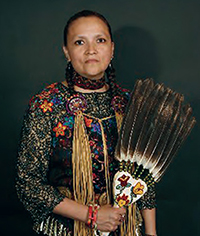 Why did you choose your specific health professional career?
Why did you choose your specific health professional career?
My first love was in the artistic realm, the design and construction of traditional and contemporary Native American dress. I received my Bachelor’s Degree in Fashion Merchandising from ASU and started a contemporary line of Native American clothing designs. During that time, my family was growing and I took a job at the Phoenix Indian Medical Center as a medical clerk to supplement my income. That was when I discovered my interest in medicine.
What experiences did you have to make sure this profession was right for you?
In my research of medicine as a possible career choice, I found out that some of the curriculum requirements for medical school involved quite a bit of science courses. I decided I would go into nursing instead and was amazed to find out that I loved and really looked forward to attending and doing the science work required in those courses. I also found that I really did want to be a medical doctor and not a nurse. Fortunately, I did well in those science courses and was able to meet some Native American doctors along the way who mentored me onward towards medical school.
Describe any obstacles or barriers to success that you encountered along your health professional career path. How did you overcome them?
I was considered a “non-traditional” student by western society standards, meaning that I was an older student with children. I had two daughters who were finishing up elementary school and one daughter on the way. I had heard that although I could not be discriminated against for medical school consideration because of my pregnancy, it did occur. I took great pains to conceal my pregnancy during interviews and in fact was offered a spot at one particular medical school that later voiced its “grave concern” that I would not be able to be successful given my pregnancy. I determined it was in the stars for me to attend the University of Arizona and made my peace to do just that. My daughter was born the week prior to matriculation and the University of Arizona was more than supportive in helping me be successful given my family status. My own mother was very instrumental in helping me achieve my goal as she lived with us and helped care for the children.
What do you do in your current job?
I am the CEO for the Colorado River Service Unit located at the Parker Indian Health Center. My primary job is administrative. I am continually working to assure that appropriate health care services are provided to the Colorado River, Hualapai and Havasupai tribes.
What advice do you have for American Indian/Alaska Native students who are interested in health careers?
Keep your nose to the grindstone and don’t let anyone tell you that you can’t do it when you know in your heart that you can. Be persistent and don’t be afraid to ask questions. Although it may sound like a cliche, it is important to always remember who you are and where you come from. This journey can be hard and challenging and may lead you to question your decisions. Knowing your traditions and core values can lead you through these difficult times. More than anything, remember that your people need you so get that education and bring it back to serve them.
What would you like to see for your tribe’s future?
I would like to see a stable tribal government that returns to supporting and uniting the Hopi people in order to retain our culture and religious ceremonies according to traditional Hopi teachings. One day I hope to see Hopis at all levels of education, traditional and western, working side by side to guide the Hopi Senom into the future.
Do you practice traditional medicine? If you do, then how does traditional medicine interact with conventional medicine?
I do seek help from traditional healers on occasion and have found their practices very helpful. I do not believe that western medicine has all the answers when it comes to healing the entire person, mind, body and spirit. I believe that traditional medicine and western medicine are complementary.

